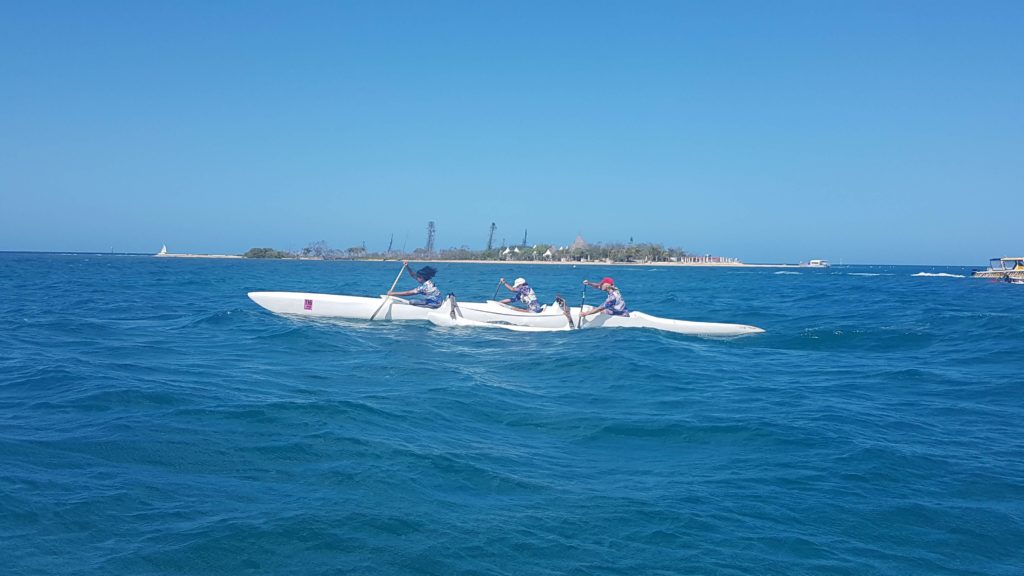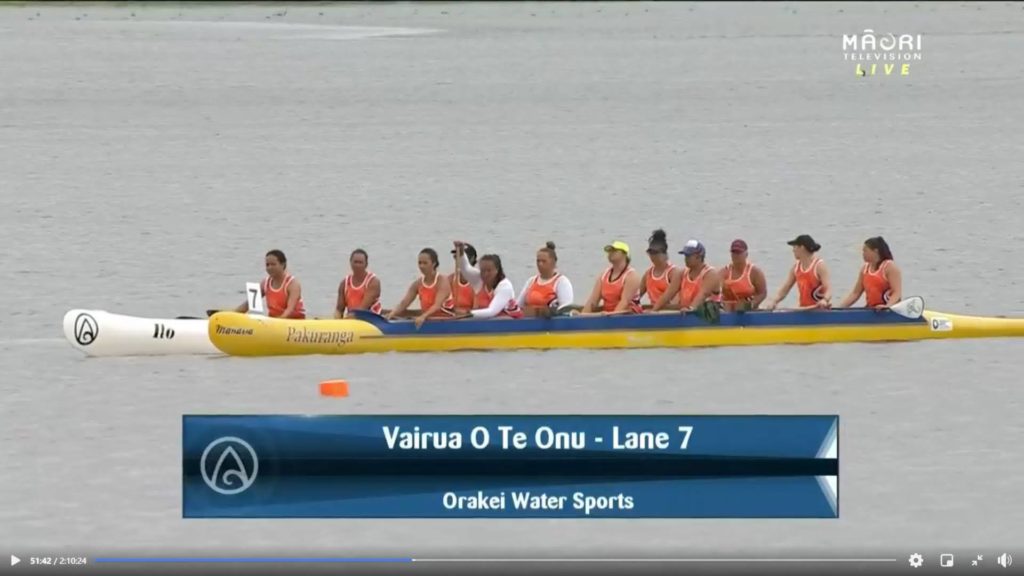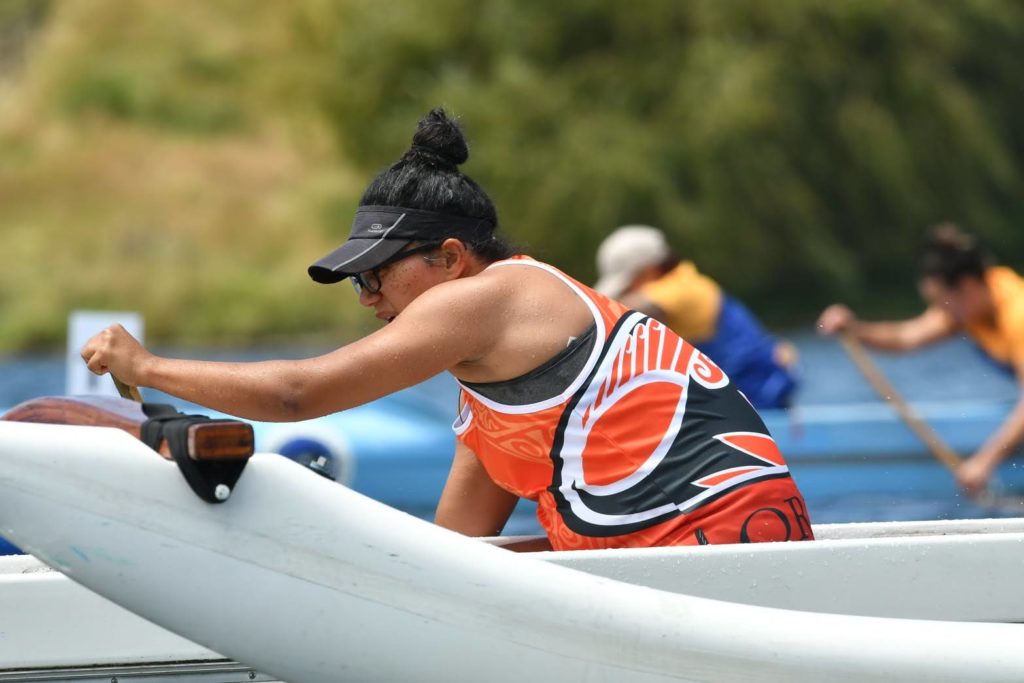23 Mar Sprinting for Two
I’m a relatively new waka ama paddler with a kete of experience just shy of 1.5 years. My husband and I fell into waka ama while living in New Caledonia where the balmy island temperature doesn’t require the mental fortitude that it does in New Zealand. Learning how to paddle while not being fluent in French added a spicy layer of mystery to our haerenga ako: Vite! (Faster), Tourne! (Turn!), Synchro! (Synchronise!). Maybe it was the team spirit, warm sunsets, or maybe it was the after-paddle croissants, but we moved back to New Zealand (thanks COVID) at the end of last year bringing with us a new and unexpected passion for the sport.

After two-weeks of burning furious walking-circles on our tiny hotel deck in quarantine, I was back on the water in less than 24 hours for my first paddle in New Zealand. There were some differences. First, New Zealand is bloody cold. Secondly, training in one’s mother tongue comes with great responsibility and I could no longer blame mistakes on my bad French: “Ohhh… when you said ‘deeper’, you really did mean ‘deeper’…”
Two weeks of turning up at every practise was enough to make the club team for the upcoming Sprint Nationals.
Coach said, “You’re coming to Sprint Nationals, right?”
I’d never done sprints before. I had a few long-distance-sign-up-on-the day-and-give-it-a-go races under my belt but doing sprints at a national competition was a whole new flavour. Now was a good time to bring up a small issue I’d neglected to mention…
“You should probably know I’m four months hapū.”
I will add the disclaimer that every woman and their capacity to stay active during pregnancy is different. I’m a first-time hapū māmā with a bump at four months that looked more like kai than pēpi. I was still feeling sprightly to keep paddling every day and my midwife had given me the thumbs-up. I calculated that by the time Nationals came around I would be quite (as in pushing six months) pregnant. An article on Stuff reported one woman in 2018 who paddled at seven months pregnant. This was both encouraging, and not. Well, if she can do it, I can do it, right? It also works the other way. Well, if she can do it, dammit what’s my excuse?
So I told my coach, “Until I can’t pull myself back into the boat, I’ll keep paddling – count me in.”
The oft-repeated but sage advice is, Listen to your body, and every preggy woman who wants to continue their sport during pregnancy needs to responsibly self-tailor this advice. Ramping up training for a national competition may not seem like the coolest idea for most, but for me, paddling while pregnant turned out to be a great sport to continue: hard-er but not impossible, low impact, and belly friendly. Being fit from the outset meant I could cash in on my past mahi and still keep up with the big kids. If anything it was the constant need to mimi every ten minutes and the daily push-ups that were the hardest part of training (I will note here, for a pregnant woman, these are push-ups that get heavier every week).
Come nationals, my club-shirt had lost its previous roominess and I was at that awkward stage of needing to clarify my appearance: I’m pregnant, not fat! I was also tired and just damn sick of push-ups.
With several thousand competitors over seven days, Waka Ama NZ runs a slick operation: live video streaming on Māori TV, all-day sports commentary, and hundreds of professional photos of the racing that competitors can take away for free. As a first-timer, I was blown away by how organised it was when it came down to the actual racing: numbered races, minimal wait times, and every participant had to have an ID card that was swiped before every race.
I’ve come to appreciate how waka ama is special in the way that the whole family can participate: there are categories for masters, seniors, opens, juniors, and an adaptive category for those with disabilties. By the time my husband and I are old, we can look forward to paddling with the other karani and koroua while watching our tamariki and their tamariki paddle. It’s so accessible that whānau of all shapes and sizes are able to partake in the races although, one sports commentator did make a remark that’s worth some reflection: “We’ve had some complaints that our waka are too small this year. Well whānau, maybe it’s us who are getting bigger.”

In the end, our team didn’t do too badly and managed to get into the w6 500m semi-finals and w12 500m finals. Not a bad effort for a newbie.
The day after my last race as we were packing up our motel, my husband looked wide-eyed at my belly: “Whoa!” It seemed, overnight, my body had let go and it was more rounder, fuller and more gravid than ever before. I took that as pēpī saying, ‘Well done māmā. It’s ok to be hapū now, take a load off.’ Thank God, because I’m done with push-ups. But I’ll be back, and next time with pēpī cheering me from the outside.

Ngā mihi nui a Toi Tangata for sponsoring the Orakei Watersports Club at the 2021 Waka Ama National Sprint Championships.

Danielle Jones
Danielle completed her Bachelor of Arts degree at Victoria University of Wellington and is passionate about issues of development and mainstreaming Te Ao Māori in Aotearoa New Zealand. She supports Toi Tangata’s kaupapa by providing administrative support.



